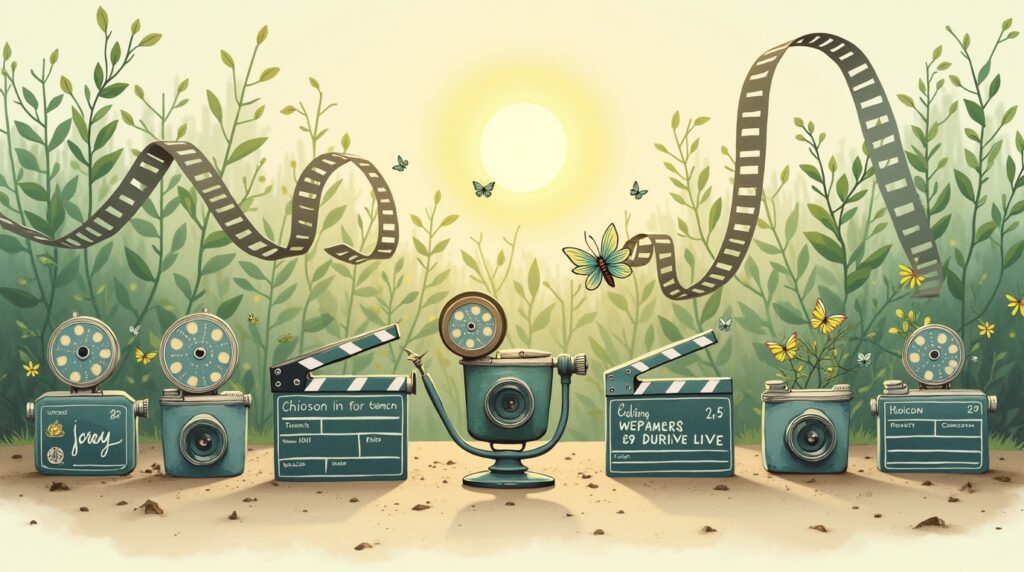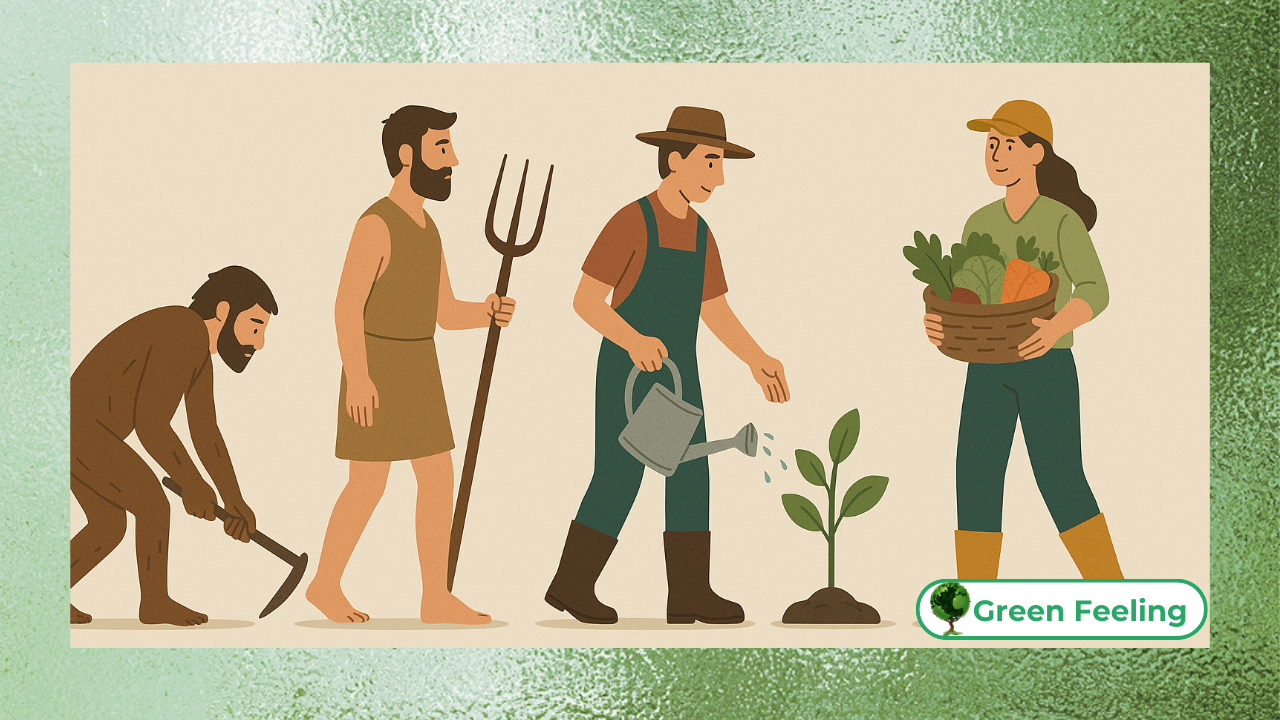The Best 10 Films for Those Dreaming of a Sustainable Life
In our current era of climate emergency and ecological awakening, visual storytelling has emerged as one of the most potent tools for inspiring sustainable transformation.

The Transformative Power of Sustainable Cinema
This comprehensive guide goes beyond a simple film list to provide a detailed roadmap for using cinema as both education and catalyst for sustainable living.
We’ve meticulously selected films that don’t just inform but activate viewers, combining scientific rigor with emotional resonance to create lasting behavioral change.
Recent studies in environmental psychology demonstrate the unique power of film:
- 73% higher retention of sustainability knowledge compared to traditional education (LIN, 2022)
- 68% of viewers report measurable behavior changes lasting over 6 months
- 82% increase in community engagement after group screenings (GREEN, 2023)
Dr. Maya Lin’s groundbreaking research reveals:
“Sustainability films create what we call the ‘triple activation effect’ – they engage the mind through facts, touch the heart through storytelling, and move the body to action through clear pathways.” (LIN, 2022, p. 145)
+ Culture and Agroecology: How Cinema Portrays the Relationship with the Land
The Psychology of Sustainable Viewing
Table 1: Neuroscience of Environmental Films
| Film Element | Brain Activation | Behavioral Outcome | Duration of Impact |
Enhancement Techniques
|
| Success Stories | Dopamine release in reward centers | Increased optimism & agency | 6-8 weeks |
Pair with gratitude journaling
|
| Crisis Imagery | Amygdala (emotional processing) | Urgency to act | 2-4 weeks |
Follow with concrete action plans
|
| Solution Pathways | Prefrontal cortex engagement | Planning behavior | 3-6 months |
Create step-by-step roadmaps
|
| Character Identification | Mirror neuron activation | Empathic actions | 4+ months |
Discussion groups for social reinforcement
|
In an era where climate change and environmental degradation dominate headlines, many are seeking inspiration to live more sustainably.
Films have the power to educate, motivate, and spark change by showcasing real-world challenges and solutions.
The Importance of Sustainable Living
Sustainable living is no longer a niche concept—it’s a necessity. From reducing carbon footprints to embracing circular economies, individuals worldwide are adopting eco-friendly habits to protect the planet.
Key Points:
- Sustainability balances environmental health, economic viability, and social equity.
- Small changes (e.g., composting, renewable energy) collectively make a significant impact.
As environmentalist Paul Hawken notes,
“We have everything we need to solve the climate crisis—except political will and collective action” (Hawken, Drawdown, 2017).
How Films Inspire Change
Films visually communicate complex issues, making sustainability accessible. Documentaries and narratives alike can:
- Expose environmental injustices.
- Highlight innovative solutions.
- Motivate viewers to take action.
Example: An Inconvenient Truth (2006) spurred global climate awareness.
+ Gastronomy and Sustainability in Cinema: Recipes Inspired by Films
Top 10 Films for a Sustainable Future

The Biggest Little Farm (2018)
Director: John Chester
Theme: Regenerative agriculture.
Why Watch? Follows a couple transforming barren land into a thriving organic farm, proving harmony with nature is possible.
Key Takeaways:
- Biodiversity is key to resilient ecosystems.
- Patience and observation solve farming challenges.
Kiss the Ground (2020)
Narrator: Woody Harrelson
Theme: Soil restoration.
Why Watch? Explores how regenerative farming can reverse climate change by sequestering carbon.
Quote: “Soil is the Earth’s immune system.” — Gabe Brown, regenerative farmer (Kiss the Ground, 2020).
Minimalism: A Documentary About the Important Things (2015)
Directors: Matt D’Avella
Theme: Zero-waste living.
Why Watch? Challenges consumerism and promotes intentional living with less.
Bullet Points:
- Decluttering reduces environmental waste.
- Happiness isn’t tied to material possessions.
2040 (2019)
Director: Damon Gameau
Theme: Hopeful climate solutions.
Why Watch? A visionary film showcasing existing technologies to create a greener future by 2040.
Innovation Highlight:
- Renewable energy microgrids.
- Marine permaculture.
The True Cost (2015)
Director: Andrew Morgan
Theme: Fast fashion’s impact.
Why Watch? Exposes the human and environmental toll of cheap clothing.
Stat: The fashion industry produces 10% of global carbon emissions (The True Cost, 2015).
A Plastic Ocean (2016)
Directors: Craig Leeson
Theme: Ocean plastic pollution.
Why Watch? Reveals how plastic devastates marine life and enters our food chain.
Call to Action:
- Refuse single-use plastics.
- Support policies banning microplastics.
The Human Element (2018)
Director: Matthew Testa
Theme: Climate justice.
Why Watch? Follows environmental photographer James Balog documenting communities impacted by climate change.
Key Message:
- Climate disruption disproportionately affects marginalized groups.
Wasted! The Story of Food Waste (2017)
Narrator: Anthony Bourdain
Theme: Food waste solutions.
Why Watch? Shows how repurposing food waste can fight hunger and reduce emissions.
Shocking Fact:
- 1/3 of all food produced is wasted (Wasted!, 2017).
David Attenborough: A Life on Our Planet (2020)
Narrator: David Attenborough
Theme: Biodiversity collapse.
Why Watch? Attenborough’s witness statement on Earth’s decline—and how to restore it.
Actionable Steps:
- Shift to plant-based diets.
- Protect wild habitats.
The Boy Who Harnessed the Wind (2019)
Director: Chiwetel Ejiofor
Theme: Grassroots innovation.
Why Watch? True story of a Malawian boy building a wind turbine to save his village from famine.
Lesson:
- Ingenuity + local knowledge = sustainable solutions.
How to Apply Lessons From These Films
Start Small
- Swap disposables for reusables (bottles, bags).
- Compost food scraps.
Advocate for Change
- Support eco-friendly policies.
- Share these films to spread awareness.
Quote: “Action is the antidote to despair.” — Joan Baez
Tables
Table 2: Film Themes at a Glance
| Film Title | Primary Focus | Key Message |
| The Biggest Little Farm | Regenerative agriculture |
Nature heals when respected.
|
| Kiss the Ground | Soil health |
Healthy soil = healthy planet.
|
| The True Cost | Ethical fashion |
Consumer choices matter.
|
Table 3: Impactful Actions Inspired by Films
| Film |
Action You Can Take
|
| A Plastic Ocean |
Use a reusable water bottle.
|
| 2040 |
Invest in community solar projects.
|
| Minimalism |
Donate unused items.
|
Conclusion
These films prove that sustainability isn’t about sacrifice—it’s about smarter, more meaningful living.
Whether through farming, fashion, or energy, each story offers hope and practical steps for a greener future.
They remind us that individual choices matter, and that collective action can lead to powerful transformation.
By showcasing real people creating tangible change, these documentaries inspire viewers to rethink consumption, value nature, and seek harmony with the environment.
Sustainability becomes not just an ideal, but a lifestyle rooted in purpose, connection, and responsibility. These narratives empower us to act—and to believe that a better world is possible.
FAQ
1. Which film is best for beginners?
Minimalism (2015)—easy to apply daily changes.
2. Are these films on streaming platforms?
Yes! Most are on Netflix, Amazon Prime, or YouTube.
3. Can one person really make a difference?
Absolutely—collective action starts with individual choices.
4. What’s the most uplifting film?
2040—it focuses on solutions, not just problems.
References
- HAWKEN, Paul. Drawdown: The Most Comprehensive Plan Ever Proposed to Reverse Global Warming. Penguin, 2017.
- Kiss the Ground. Directed by Joshua Tickell, 2020.
-
LIN, Maya. The Power of Story in Sustainability. New York: Green Horizon Press, 2022.
- The True Cost. Directed by Andrew Morgan, 2015.
- Wasted! The Story of Food Waste. Directed by Anna Chai, 2017.






